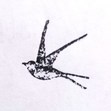Hûw Steer's Blog, page 5
March 22, 2025
An Adventure #1 – The Shire
I have gone to the other side of the world, and I have come home. Spiritually, I mean. I’m still abroad. You might almost say I’ve been there and back again.
It’s been a whirlwind first week of honeymoon: we started in Australia, ran frantically around Sydney from landmark to landmark, flew over to New Zealand, ran frantically around Auckland and up multiple volcanoes, grabbed a car, drove a few hours inland…
And came to Matamata. Though you might know it by another name.
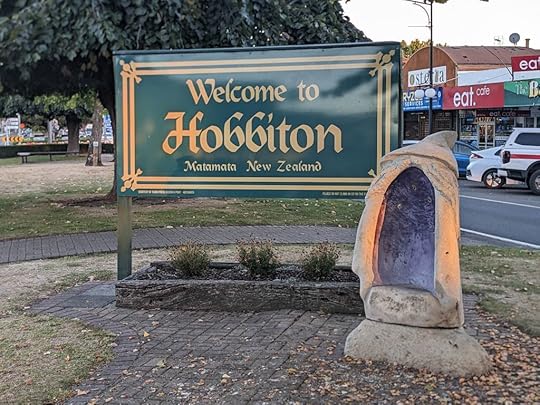
Our introduction to the Shire proper was less than gentle, because we did it through the medium of an 11.1km run (because even for the bit, we couldn’t quite face a halfling-marathon). A run across the farms around, and through the actual set, of Hobbiton. This was amazing. It was also perhaps the most physically demanding thing we’ve ever done. I was feeling all smug when we first landed, thinking ‘yeah, we’ve been doing lots of practice runs, it’s a long way but we’ll be absolutely fine.’ Dear reader, we practiced on flat ground. This is the Shire. It’s all hills. Hills and sheep-tracks and narrow paths and also boiling hot. We did not finish with a respectable time in any way, we (at a charitable estimate) only ran about half the distance because the hills were almost too steep just to walk, but we did finish, and we ran the last bit, and it was bloody great.
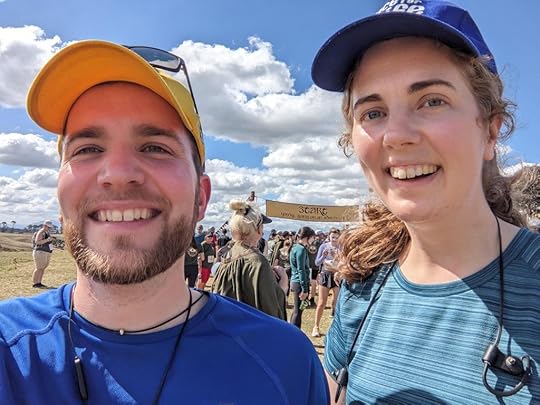 Before
Before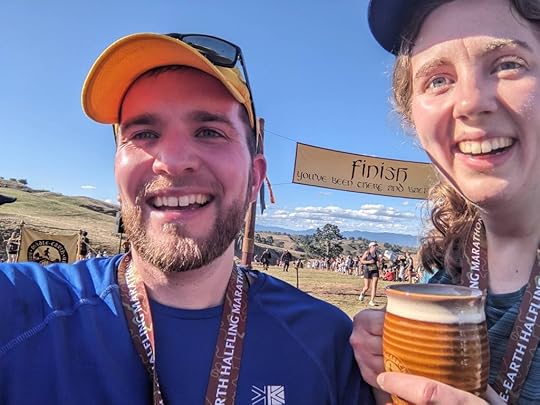 After
AfterI didn’t quite have time, when we were running through it, to fully appreciate the beautiful Hobbit idyll around me. Which is why we went back this morning for a more sedate tour.
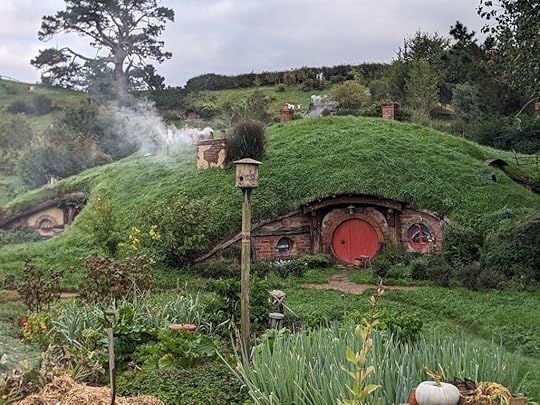
It will come as no surprise to any of you that I adore The Lord of the Rings in all its forms, and I have done since I was very, very small. I am in every aspect apart from height – and even then, not that far off – a hobbit; I have always said that, given that I did actually grow up in Herefordshire and Shropshire, I come from the Shire. And now I have been there, in truth. And it is astonishing.
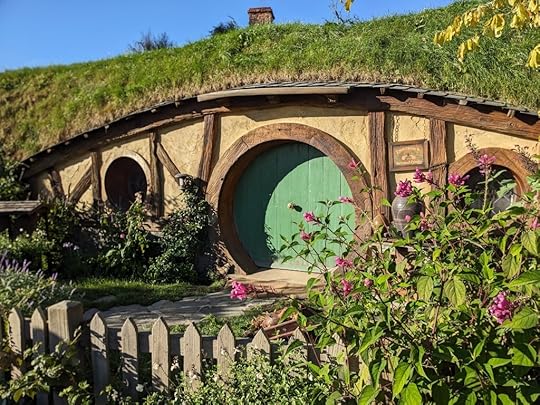
They tore down the set from the original film trilogy, because it was made of foam and cardboard, but when the time came to film The Hobbit movies they rebuilt it and this time properly. Wood and stone and real flowers, real vegetables in some of the gardens, woodsmoke from the chimneys. Some of the holes are very small, because Forced Perspective Cleverness; most of them are just facades, including Bag End itself, because they shot all the interiors in studio… but there are a couple that you can go inside. And the sheer detail would make Tolkien weep.

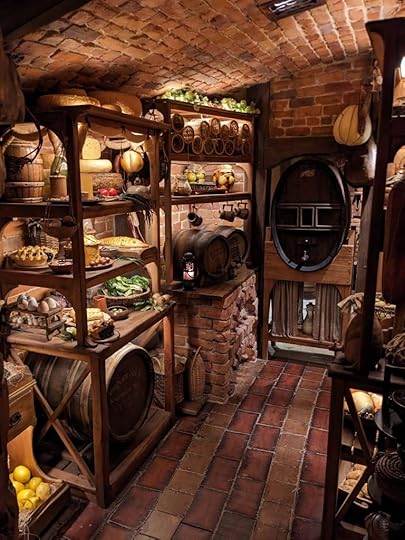
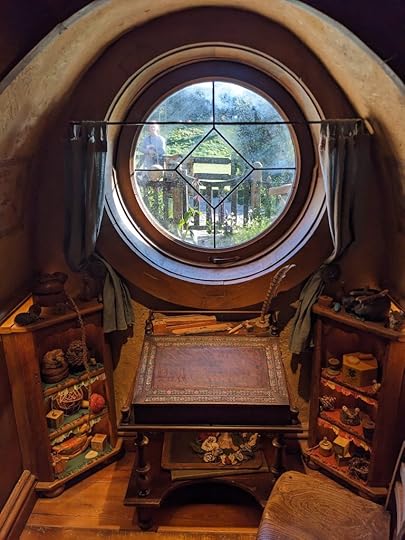
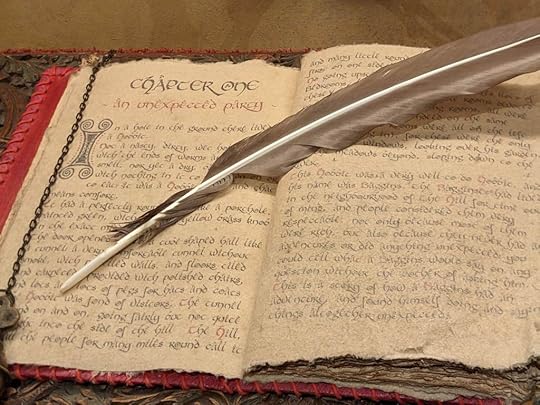

Children’s toys, and clothes, and an actual full-on newspaper, written by the scriptwriters (that for some reason you can’t buy, grr); there are letters in the postboxes, water dribbling from the pumps. It’s perfect. I wouldn’t have been surprised if some of the extras had never left. We did try to hide but our guide eventually found us in the wine-cellar and dragged us off to second breakfast. (Which we did have, at the Green Dragon, and which was delicious.)
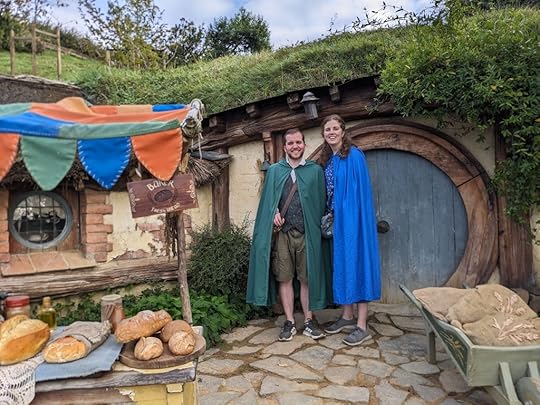
I am a big nerd, as is my wife. We wandered around in our cloaks and took hundreds of photos and just beamed at it all. Because we had stepped into Middle-Earth. And I had been feeling this way, in truth, since the moment we turned off the main road and onto the winding hill-roads that come up to Matamata and through the farms around Hobbiton. I idealise the landscapes of my childhood, the flowing fields of my youth – just look at The Singer – but this was truly like stepping into a book, into the fantasy of my younger years, into a reality that I have so long admired and come back to and experienced in so many ways. Because when you read or watch The Lord of the Rings there are many beautiful things to behold: the Falls of Rauros, the endless plains below the golden hall of Meduseld, the White Tower, flawless Rivendell. Whether you’re watching Peter Jackson’s films or reading Tolkien’s prose you are always transported, or at least I am.
But there is one place that holds my heart, every time, whether on page or screen. There is the Shire. It is peaceful, it is beautiful. It is home. And they found the perfect place to build it, and build it they did, and now I have been there.
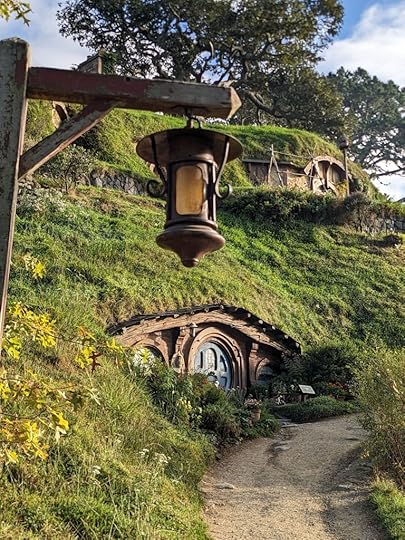
We had to leave, eventually. We took our last few photos, we drove off. We made it about 200 yards out of the car park before we stopped at a nice little viewpoint, because the sun was up and the view was lovely. And then I cried. I properly broke down in tears, and when my wonderful wife partly reassembled me and asked if I was alright, all I could say was ‘it’s just so beautiful’. And it is. And yes, it’s been a busy few weeks, and I was tired and stressed by many small things because holidays like this are wonderful but not always relaxing, and on top of all that we were physically shattered because of the bloody run.
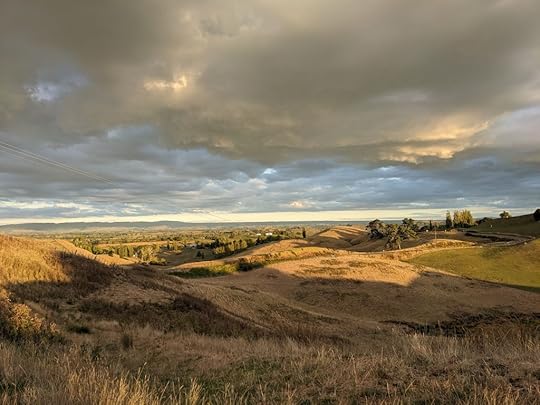 The offending view.
The offending view.But it was just so beautiful. And I didn’t want to leave. Because, in a way, I’ve always been there, in my heart. And it felt like coming home.
March 9, 2025
I’m Going On An Adventure
On Friday, I’m off to Middle-Earth.
Well, I’m off to New Zealand. Well, first I fly to Dubai, and then I fly to Australia for a few days, and then I fly to New Zealand. And I is in fact we, because my wife and I are off on our honeymoon at last. But apart from all those minor details…
The other side of the world. When we get off these flights it’ll be the farthest away from home we’ve ever been. We have two weeks of driving around this far green country to look forward to, from glittering caves to pristine beaches, bookended by a few days down under at either end. There’ll be a lot of walking, too; I want to see mountains, mountains, and probably climb a bit up them as well. It is a long holiday, a very long holiday, but I suspect we shall return.
And yes, I am making sure to use as many Lord of the Rings quotes as possible, because we are both enormous nerds and the fact that my wife’s family are actually from New Zealand is pretty much a secondary concern behind the sheer amount of LOTR stuff that we’re going to visit. If I remember the gloriously colour-coded itinerary correctly there are at least four different tours of different bits of set on the horizon, including Hobbiton itself, around which we will in fact be running an eleventy-one kilometre race (well, 11.1km). How much air resistance does a cloak provide? We’re going to find out.
We have wildlife to meet, we have hikes to do, we have delicious foods to taste and we have wonders to see. It’s only the North island, because we’d need another month to get around the entire country, but that just means we’ll have to go back some day. Oh no.
It’s been a long time in the planning, this trip, and though all the last-minute prep and packing is a bit of a nightmare, we cannot wait.
So there’ll be no blog next week, because I will have just landed on the other side of the world and I probably won’t even know my own name, let alone which way is up. (I’ll still write something, of course, but I imagine they won’t be the most coherent 500 words of my career.) But I will post a few updates on the stuff we’ve seen as we go. There are wonders to behold out there, as the legion of former LOTR extras will be eager to show us.
And I do actually quite like a long flight. It’s a very long few flights, of course, but being forced to sit down for hours with nothing but all my technology and literature for company is approaching my idea of heaven before we even land. I have a new(er) Kindle, which is working nicely so far, the Steam spring sale starts the day before we fly, I’ve got a solo pen-and-paper RPG I’ve been saving and if my wife is sufficiently distracted I’ll nick her laptop and finally try Baldur’s Gate 3.
And I’ll write. I have some short edits to do, some more submissions to make. And I’ll still be writing every day while we’re away, because that stops for nothing. And I’ll be writing in a new and far-off country, a new environment, breathing new air and seeing new sights, and I honestly cannot wait to see what that does to the words I put on the page. I wrote The Singer while thinking of home – what world might I conjure out there in New Zealand?
At some point, you’ll find out.
March 2, 2025
e-Readers – The Reluctant Upgrade
I read a lot. It was inevitable, therefore, that I’d end up with an e-reader. I got a Kindle back in 2010, and I filled it with ebooks of all kinds, and I spent the next 15 years continuing to do so. My digital library is truly vast at this point and it shows no signs of shrinking, and I intend to swell it even further very soon with a few indie titles to fill up the old machine.
I say ‘the old machine’. The e-reader in my hands is not my original Kindle. But because I am very much a creature of habit, it is the same model as I first got 15 years ago, the good old Kindle Keyboard. That first Kindle lasted me 11 years of constant reading, 11 years of books, until in 2021 it finally gave up the ghost and froze forever. I was at a loss. Because after more than a decade of development Kindles and e-readers generally had come on a long way… a long, far more expensive way. And for all the benefits of touchscreens and backlights I was, and remain, that creature of habit.
So instead of buying a new Kindle I snagged my mother’s old unused one, an identical Kindle Keyboard that fit as snugly in my hand as the old Book of Hûw (for such was its name) ever did. It lasted… well, about 5 minutes, actually, before I realised that the battery was completely and utterly buggered.
But I am not only a creature of habit, I am a man who refuses to give up on a thing until it is completely, unusably, broken. I am a man who is currently regularly reinstalling the YouTube app on his decade-old iPad because the OS is so out of date that most stuff just doesn’t work anymore. I am a man who is simply not installing the update that will probably ruin his old Pixel’s battery life. And I like to tinker. And so in my laboratory one evening an abomination was born, a fusion of old and older, as I dismantled both Kindles, stripped out the dead battery from my mother’s device and plugged in the still-functional one from my own frozen one. And lo: it was alive! The Frankenkindle lived on, and I could read on, for another year or so, before that composite too gave up the ghost and froze. I was happy with that. Another free year of life was nothing to sniff at.
But in 2022 I remained two things: a creature of habit, and broke. I once again ignored the shiny new devices Amazon attempted to peddle to me, ignored how much nicer and smoother my wife’s own newer model ran, and went to eBay to purchase a third Kindle Keyboard. This sits before me now. It runs. It reads. It is familiar, and it is mine, and I am loath to ever change that.
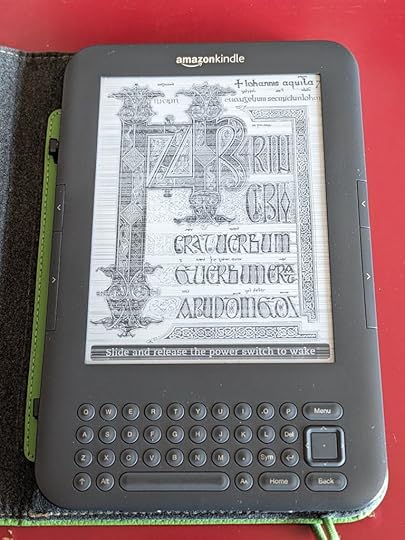
A paper book is always a nicer thing to read than a digital one. The tactility of turning pages, the smell of paper old or new, the feel of it in your hands – nothing digital can ever truly compare. I own a Kindle for convenience, for the ability to carry a thousand books with me at a time, to be able to instantly begin the next in a series barely lifting a finger. But in fifteen years I have become so used to this machine in my hands. The buttons, the keyboard – now largely pointless after updates and redundancies – the weight, the look of the screen. The Kindle Keyboard is as familiar to my hands as a paperback. It isn’t as pleasant to read on an objective level, but I love it just as much.
And this one, too, is on its way out. It is a new ailment that affects the Book of Hûw Volume III: its screen is full of lines, the e-ink giving out a few beads at a time. It’s still entirely usable, still readable, but it is getting worse, and one day soon, I fear, the words will no longer be words. The battery is sound, it doesn’t freeze often, but it is at best more than a decade old, for all that I only got it 2 years ago. And so are all Kindle Keyboards now. And very soon, I will have need of an e-reader, as I take a trip to somewhere very special indeed (more on that soon).
It’s been fifteen years of familiarity. It is time, at last, for an upgrade.
I’m still broke, though, or if not actually broke then still very much not wanting to spend almost £200 on a new device. And while I don’t entirely like being beholden to Amazon, my whole library is in their formats, I’ve got a few gift cards, and I am not quite ready to pledge my allegiance to another e-reader yet. (And yes, I could convert everything, and I already have my whole library in some other formats, but still: faff.)
So a 7th generation Kindle wings its way to me; four years and four iterations (plus all the other types they invented) more modern than my own, for all that it is still over a decade behind the current curve. It has a touchscreen. It has double the storage. It has a few marks on the screen, sure, but it was also only £20, so I think I can cope with that. It will work. It will do. I will get used to it. It will be a better reading experience by far.
But I’ll miss my old friend with its pointless keyboard. Not that I’m getting rid of it, mind. Even if and when it does break, I’ll still probably try and mend it. That’s just who I am.
And I might want to play Minesweeper one day, anyway. Bet your fancy Paperwhites can’t do that.
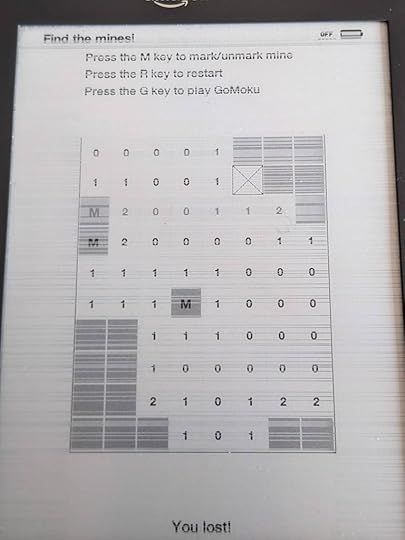 Drains the whole battery in about an hour but it’s absolutely worth it.
Drains the whole battery in about an hour but it’s absolutely worth it.
February 23, 2025
2 Million Down, A Lot To Go
It feels very odd to not be writing a book right now.
I’m writing – of course I’m writing, I am never not writing. In fact, as of this month I have been writing a minimum of 500 words a day for the last 10 years. This is a lot of words. A couple of years ago I did some maths, in fact, and came up with a definite number of 1,482,000 words, plus all the redrafts, the first few years of blog posts, essays, and unfinished/barely started projects that I’ve put together over the years too. Given the theoretical minimum for 8 years of 500 words a day was 1,465,000 words, I was rather pleased.
10 years, though, is getting big. 1,825,000 words, at minimum. Ok.
To that definite number, I can add:
The Owl in the Labyrinth: 130,000 wordsAll the unused material from the first draft of The Owl in the Labyrinth: another 20,000-odd wordsA bunch of short stories: about 77,000 words (at least – I have been busy with shorts these last 2 years)Over a year’s worth of sessions and backstory for my homebrew Warhammer 40k RPG: about 60,000 wordsBlog posts: about 45,000 wordsA bunch of unfinished projects: another 37,000, again at least…A total of 369,000 words, ish, bringing my (again very roughly) estimated total up to 1,851,000 words. That’s a lot of words. Ye gods, that’s a lot of words. Add in the aforementioned Uncounted Stuff… yep, that’s easily clearing 2 million. Huzzah! I Write Lots.
But as I just mentioned I’m not currently writing a book. By which I mean a long-form project rather than a short story (even though my short stories are usually far too long), a novel or a novella. 2 years working on The Owl in the Labyrinth was a long time, the longest I’ve spent in one go working on a single story, and it honestly drained me, a lot. I’ve been putting everything I have into the Boiling Seas for a long time and when I finally finished the second draft I was relieved as much as I was proud. Away to the proofreaders it has gone, and from them (hopefully soon) it will return. But until then I’ve been leaving that book alone. I’ve just been… writing. A few new short stories, a few new long stories branching off from them, RPG stuff, the beginnings of a future project or two, I’ve been dabbling in all manner of things.
But I think I’m starting to get withdrawal. I think my mind craves a longer plot, something beefy, something that will take me a year or more to finish, something substantial. I fear, dear reader, that I must start writing another book, and soon. My mind is restless, my hands more so.
Do I have any ideas? Yes. Do I also have several other things that I need to do first? Also yes; a significant rewrite/edit/rework of an existing project.
Am I going to do that at the same time as powering off on a completely different book project, almost entirely for the love of writing? Hell yes I am.
February 16, 2025
The Future Is Now
2025 feels depressingly like a Future Year. We’re well into the era that sci-fi has been telling us for years will be full of much cooler stuff than we actually seem to have ended up with. Blade Runner happened 6 years ago, for crying out loud: where are my flying cars, automotive industry? Why am I not writing this from space, on a hologram, with the power of my mind?
Unfortunately, of course, we’re starting to get all the rubbish bits of near-future sci-fi with none of the cool stuff. I stumbled upon a reddit post yesterday outlining just how prophetic Deus Ex: Human Revolution was about current world politics in a fictional ‘2026 Global Politics Review’ and it was profoundly depressing, in truth. The world is shaping up to be exactly what DX:HR predicted but without even the smallest glimpse of awesome robot arms. We’ve got all the evil megacorporations and corrupt governments of cyberpunk without a drop of cyberspace to balance things out, and no, the ‘metaverse’ and ‘AI’ don’t count, or at least only count on the bad end of the scales.
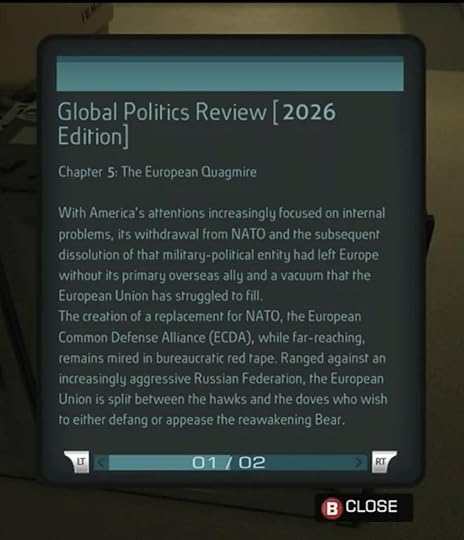
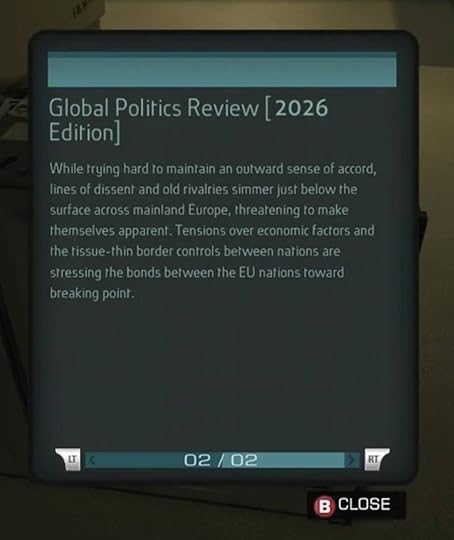
So I encourage you, dear reader, to think about the cool sci-fi stuff that we do have, that we already are developing, even if it doesn’t feel like sci-fi until you stop to think about it. Forget cyberpunk for the moment. Think solarpunk. Books like The Pono Way by Kristen A. Corby, that showcase a vision of the future that actually admits a little bit of optimism, where humanity actually sorts some stuff out. There are fewer giant robots and the like, as a general rule, but it is, in many ways, that bit more realistic. At least we can hope so.
Solar power. Wind power. We literally farm electricity; humanity has turned lightning into a crop, and if you told our ancestors such a thing was even possible they’d laugh in your face and/or burn you at the stake. Renewables aren’t perfect yet by any means, they’re not anywhere near as widespread as they need to be, but they exist and with luck they’ll only get stronger. Imagine a future landscape not ravaged by nuclear fallout but dominated by the white forests of turbines, the glassy lakes of solar farms that stretch across countries. Where the seas themselves yield power aplenty from the very tides.
I’ve been writing recently about the wind farms of the future, at first just as a bit of worldbuilding but currently in a far more involved way. They appeal to me most, of all the sustainable ways we’ve harnessed the planet. I think it’s because they’re the only one that takes bad weather or conditions and turns it into something useful, while solar cells and the like rely on it actually being sunny. Storms used to destroy our harvests, and still do: now we can harvest them in turn.
And vertical farms! I met a vertical farm company quite by chance at a sustainability fair and what a concept. The sheer efficiency of these things, cramming so many crops into such a small space, using height when what we lack is breadth in our existing fields, it’s fantastic. And they really do look futuristic too, even though they’re already being trialled all across the world. That laboratory, industrial aesthetic really adds to the sci-fi feel. Again, I’ve been writing about these recently: after seeing this sort of tech how can I not? There’s a lot to be done in futures both dark and bright with farms so compact, so concealable, so versatile…
 The model unit I saw in 2022…
The model unit I saw in 2022… And the full-sized equivalent. Credit to Intelligent Growth Solutions.
And the full-sized equivalent. Credit to Intelligent Growth Solutions.I could go on. I probably will at some point soon. But the point of this is to remind me, and you, if you’re reading, that while we might be closer to the ‘future’ than we might think, not everything has to be dark and gloomy. Even when the worst predictions are starting to come true, things more wonderful and bright are being worked on than the cyberpunk writers of old ever even imagined.
Who knows? Maybe there’s hope for robot limbs after all.
February 9, 2025
BOOKED – A Podcast What’s Got Me On It This Week
If there’s one thing that you, dear readers, know full well that I love, it’s going on an extended ramble about my various niche interests. This is more or less a weekly occurrence here, and always will be.
But WHAT IF that ramble was punctuated with actual insight into my own writing? What if that ramble was in the form of a conversation with another excellent human being? And what if that ramble was not, for once, written down, but was actually in the form of a full-blown audio and video podcast?
That, you would correctly surmise, would be pretty rad. And, if you’re reading this at 6pm GMT/noon CST/some other equivalent time, then that is precisely what has happened.
Hopefully you should actually be able to watch this by the time this post goes live…Indiosyncrasy is an absolutely brilliant project from the absolutely brilliant Saffron Asteria, who has dedicated a considerable amount of her time to promoting, sharing and generally boosting the entire indie author community purely for the love of it. The site – which you should check out – is a hub for hundreds of great authors and all their great work (including some familiar faces) – the social media is full of support for everything we do, and the amazing BOOKED podcast is right above this paragraph. Every week it’s a new interview with a new author from the ever-expanding Indiosyncrasy stable – every week someone new to get to know.
And this week it’s me. I recorded this with Saffron back in November. It was absolutely tremendous fun. It was an hour that alternated between incisive questions about my writing style and my work and extremely silly banter about Sonic the Hedgehog and Doctor Who, and I can’t think of a better insight into me as a person and a writer than that.
So give BOOKED a listen, or a watch, because you can do both thanks to the magic of technology and it’s on all the Spotifies and YouTubes and Apples and Amazons and basically anywhere podcasts lurk in the corners of our vision, ready to strike and feed.
And because it was a good excuse to do it, and because my KDP enrolment periods were ending anyway and I might as well, in celebration of this lovely podcast pretty much all my books are on sale for the rest of the week!
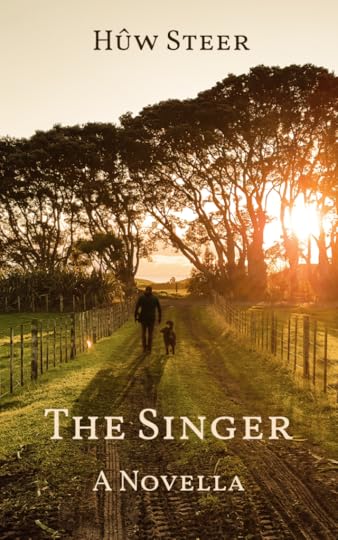
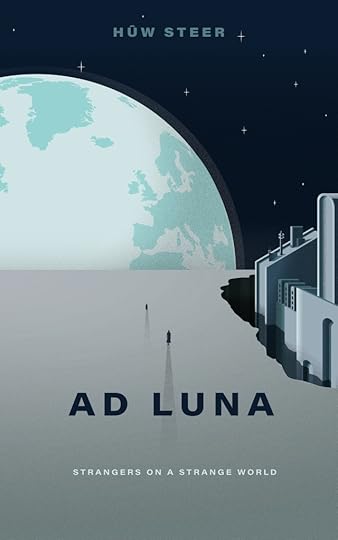
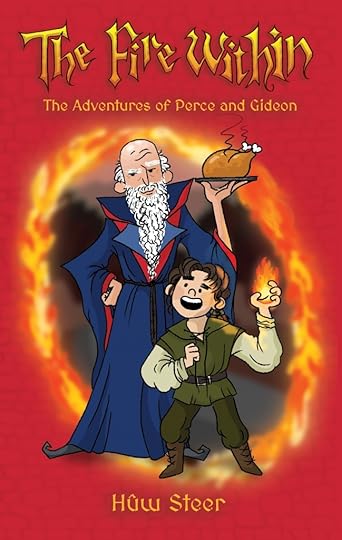
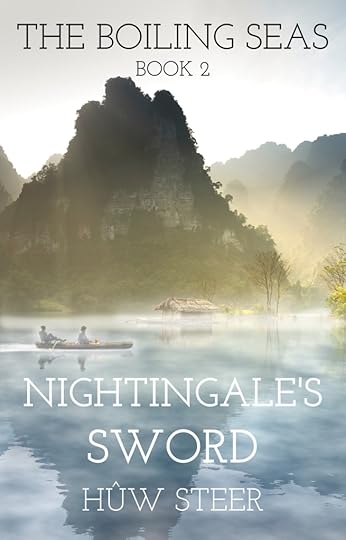
The Singer – FREE
Ad Luna – £0.99
The Fire Within – FREE
Nightingale’s Sword – £0.99
So if you managed to hear something book-related in-between the Doctor Who chat in this podcast and thought you might pick one of them up, then now is the time!
When I’m not rambling about one of my weird interests on this site, I’m usually writing about those difficult times that seem to be most of the time for indie authors: the lack of visibility, the lack of reviews and sales, the lack of respect. This is a hard path to walk. It’s hard to get seen, when there’s so much stuff out there. With Indiosyncrasy Saffron is trying to make it easier for all of us, and we authors can only thank her for that.
February 2, 2025
Unconventional Perspectives
I have (re?)discovered the joys of writing in-universe propaganda, and I wish to share them with you.
My homebrew mess of a Warhammer 40,000 tabletop RPG game has been on hiatus for a little while now due to various bits of life getting in the way, and it looks, unfortunately, like it’ll be on hiatus for a little longer for the same reasons. It’s a shame, because the Grand Finale is coming up, and I don’t want to do that Grand Finale without all my players being there and being ready to get stuck in. Hence the hiatus: we’ll wait until everyone is good and ready before bringing this chapter of the bizarre story we’ve woven together to a close, and that’s just fine.
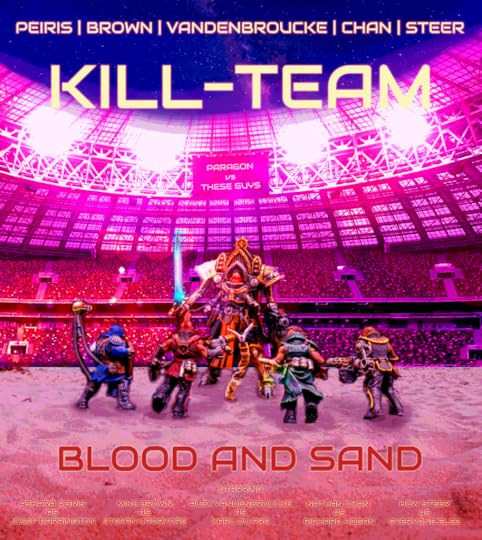 Also making these film posters for each mini-arc is great fun. I need to take the time to catch up, I’ve got loads of ideas bubbling for the next few.
Also making these film posters for each mini-arc is great fun. I need to take the time to catch up, I’ve got loads of ideas bubbling for the next few. But some of my players are available. And while I don’t want to bring out only some of our intrepid band of technicolour heroes, that doesn’t mean they can’t take control of some significantly more disposable characters for a spinoff session or two. But how do I announce such a game? And also, how do I keep my players caught up with the current events of the campaign after such a long break?
I could just write a summary. That, however, would be boring. Time to get my head in-universe.
Radio transmissions have been intercepted. Government propaganda has been spotted, pinned to the crumbling walls of a city at war. And I’ve got plans for an awful lot more, because fully committing myself to a completely different narrative voice is so much fun. I’ve done it before a few times, when inventing fictional books to quote extracts from in my fantasy works, or writing up the future notes of military campaigns that my characters are currently fighting. But these last few have been far more entertaining. Just the act of switching fonts, of appending each radio message with times and dates and sender codes has been great fun. It’s a very literal exercise of getting into a character’s voice: not just describing what they’re doing or saying or thinking but writing in the manner that someone else would write. My personal summary of the events of the last few sessions is going to be efficient, but matter-of-fact. The in-universe summary of the office of the planetary governor, in the form of a public service announcement in the most over-formal and flowery language I could muster, is a much more entertaining read even if it lacks some of the precise details. For those, I’ll have to write some more clandestine briefings up: interrogation notes, confidential mission reports, that sort of thing.
Hell, following on from last week I might record a few of these in audio just for the hell of it. I can do a few accents, and if I can find some nice radio-crackle filters to slap on top…
This is an exercise that I would urge any other writers reading this to try out. Get in the perspective of someone in your story. Write down what they would write down, whether it’s a letter, a radio transmission, a report, whatever – anything but conventional prose. Get in their head and their voice. Convey things directly as they would convey them, not how your POV characters would perceive them. It broadens your perspective, it flexes some writing muscles that I certainly don’t use as often.
And it’s fun. It’s a lot of fun.
Now, I’m off to put together some cargo manifests.
January 26, 2025
Narrative Voice
As a general rule, whenever I have the time and opportunity to sit down and read, I do – and whenever I have the time but not the opportunity, I’ll still find a way to consume a story. If I’m out and about, whether it’s a walk to the shops or a run, I’ll pop in my headphones and listen. If I’m on public transport, if I’m at the gym, if I’m doing just about anything on my own outside the house that leaves my ears free but my eyes and hands busy, I’ll have some audio on. Often, it’s a podcast of some kind. Just as often, it’s an audiobook.
I’ve always listened to books. When I was a kid I couldn’t get to sleep without some sort of gentle narrative playing – my parents, by contrast, have told me stories of going slightly mad, hearing the muffled tones of Stephen Fry narrating a different audiobook through each wall, one for me and one for my sister. I still find it hard to sleep without a story on – thankfully my wife is of the same persuasion or I’d be in trouble. (Nowadays, though, we can use the Greek myths books, rather than Harry Potter.) It’s not like I just stick it on and forget, mind – constant fiddling with sleep timers and the like means that I just have to rewind a little and then pick up where I last remember being conscious. And I listen to just as much when I’m fully awake; different books, different stories, but always some story. It’s sci-fi and fantasy; of course it’s sci-fi and fantasy. I’ve been fuelled, these last few years, by the Audible subscription that I thought I’d use for maybe two or three months and then cancel, but have instead managed to keep using consistently every single month. I don’t listen to as many books as I read by any means, because I read fast, but I listen to a lot. It’s comforting. It’s distracting. It lets me escape even when I’m on the move, even when I’m doing something that tethers me to the here and now.
The thing about audiobooks is obviously that they’re different to physical books, but for me that extends to the way I choose them. With a book, I might look for a favourite author or a similar series – but with an audiobook, you absolutely have to have a good narrator.
Several of Adrian Tchaikovsky’s books are read by David Thorpe – Cage of Souls being, I think, one of the best audiobooks I’ve ever encountered – and since hearing Ray Porter read Andy Weir’s Project Hail Mary, a book to which the audio format adds a huge amount that simply can’t be translated by the written word alone, I started the Bobiverse books on the basis of his narration alone. (And then stayed for the excellent, tongue-in-cheek writing of Dennis E. Taylor.) If an audiobook is to capture you, the narrator’s voice has to match the author’s, and that is hard to do. Dune is a fantastic book. The audiobook version I bought years ago was absolutely appallingly narrated (the narrator would use different voices for the same characters seemingly at complete random) and has genuinely put me off re-reading the book even physically. On the other hand, the way Kobna Holdbrook-Smith narrates the Rivers of London books is so good that Ben Aaronovitch has stated that he now writes in Holdbrook-Smith’s voice, not the other way around. Apart from Dune, I would genuinely recommend that people listen to these books instead of reading them. That’s how good a good audiobook can be.
(I should note here that I’m not a huge fan of the recent trend towards ‘graphic audio’ and full-cast narrations of books – the relaxing experience of an audiobook for me is one with a single narrator, a storyteller rather than a radio play. Not that I dislike radio plays at all, but they are not the same thing as an audiobook, in my opinion.)
Finding those good narrators is hard. It made me, as a writer, quail a bit, at the looming expense of such a recording, of the difficulty in finding such an artist, of matching those authorial and narrative voices. But among the many books I’ve listened to of late are a handful that made me feel if not necessarily better then at least differently. Because while I will always listen immediately to anything David Thorpe reads for Adrian Tchaikovsky, I’ll also immediately pick up the books that Tchaikovsky has narrated himself. In particular Service Model, in which Tchaikovsky manages to flex his voice acting chops a bit further, tackling a nice range of characters while still nailing the inner and outer voice of the robot valet Charles. If there’s one way to ensure the narrative and authorial voices match, it’s for them to be the same voice. Assuming you’re good at reading aloud, like Tchaikovsky is.
Like I hope, maybe, I might be. Because this has just been a very long-winded way of not only talking about audiobooks but about the fact that I want to have a go at reading some of my own work. I’ve already found some excellent voices for potential audiobooks, but there are some stories that I think might work with this more personal approach. There are some stories that I’d like to tell again with my own voice. Maybe. Assuming I can get my hands on a decent microphone and filter, and manage to keep a consistent voice for longer than a few lines, and have the time to sit down and record for hours…
But I had a go. Only briefly, only with my phone, only for fun. I am no stranger to public speaking, whether on stage or on a recording – sketch shows and panels and podcasts (spoilers) have proven that. But it’s a rather different feeling, not doing it live.
Anyway. I don’t know how good it sounds. But maybe you lot can let me know.
January 23, 2025
Indie Book Spotlight – Interview
I realise that this whole blog is largely me talking about myself, but if you want actual, concise answers to relevant questions about me and my writing, check out this interview with the lovely Rebecca at Indie Book Spotlight!
Author Interview with Hûw Steer
January 19, 2025
Specificity; or How I Learned to Stop Worrying and Just Keep Writing
Among the aspects of short story writing that I never appreciate until it’s slightly too late are the pros and cons of writing to specific markets and briefs. I don’t just mean the different styles of different magazines: that’s a far more subjective and hard to gauge thing, in my experience, as what I might consider to be ‘dark’ or ‘character-driven’ writing may simply not match the expectations of the editor who ends up reading it. In those cases I submit and see what sticks. Largely it doesn’t, but give it time.
No: I mean the specific markets; the themed anthologies, the hyper-exact needs of very select publications. The need, say, for a sci-fi story that’s specifically about trains, or that’s set in our world within the next century of space exploration, or even in the specific setting of an upcoming RPG. Most of the time, when I see these calls for submissions, I simply can’t fulfil these briefs. I either don’t have a story that fits the bill, or I don’t have the time to write one to the order. I do my best to work on one project at a time, so that I actually get things finished (with my apologies to multiple rambling shorts that languish, awaiting their endings) and usable – so to that end, especially when, say, finishing the redraft of a trilogy conclusion, I do my best not to stop what I’m doing and chase a different narrative altogether.
But sometimes the concept grabs me. Sometimes I see a theme and the ideas just blossom, unlooked-for, in my mind. Sometimes – as actually happened twice towards the end of last year – I see a themed call and just sprint for the keyboard, and several hours later I realise that I’ve skipped lunch, should really have responded to all those work emails already, and have a fully-formed short story in front of me, tailor-written to that shining, inspiring theme. Those are good days. Those are among the days when writing feels that little bit like magic.
So far, this may sound very much like a pro, not a con. The con, however, comes later. The con comes long after I’ve submitted the story, when I actually receive… a rejection. A rejection for a story tailor-written to that highly specific brief. A story that, without that specific brief behind it, suddenly doesn’t seem to fit anywhere at all.
The thought that comes is, of course, what the hell do I do with this now? Because it’s days of work seemingly down the drain, seemingly now completely pointless. Who else is going to read this story, if not the people it was specifically written for?
Can you tell this happened to me recently yet? It did. It’s annoying. It’s frustrating. It’s depressing. But, as I remind myself through the very process of typing this post, it is not the end. Because even if I have to do a little filing-off of, say, RPG-specific serial numbers and terms, the story that I’ve written is still good.
I wrote a story for an anthology themed around future wetware, weird and wonderful neuro- and body-technology. It got rejected from that call. I sat on it for a little while, then submitted it again. That story was Blank Slates, published in Shoreline of Infinity. A few years later I entered the Jim Baen Memorial story contest with a piece of what I thought was seriously good near-future sci-fi… and though I did make the first cut I got rejected. Now Great Martian Railways is in Analog.
Even if it seems too specific, even if it misses that shining, perfect market, what you’ve written is still good. You might need to tweak it, you might need to adjust or even change whole sections, but if you’ve written something you think is worth submitting to a call, then there is something good in there, even if it’s buried under what now seems pointlessly targeted. Edit it, sit on it, think about it, change it. But never give up on a good bit of writing.
So I’ve filed off those serial numbers, and tried again. Because I reckon this is a good bit of storytelling, and somewhere out there is somebody who’ll agree with me. Probably.

